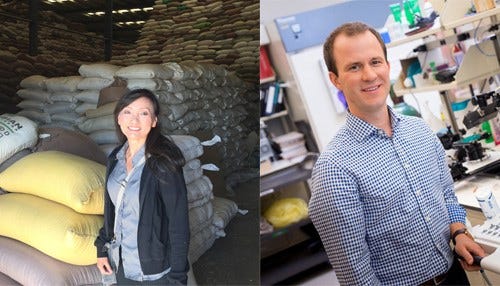Two Purdue Projects Seek to Save Moms
 Dr. Yuehwern Yih's (left) project focuses on the medical supply chain
Dr. Yuehwern Yih's (left) project focuses on the medical supply chain
Subscriber Benefit
As a subscriber you can listen to articles at work, in the car, or while you work out. Subscribe NowThe Bill & Melinda Gates Foundation is on a mission to reduce the number of infant and maternal deaths in Sub-Saharan Africa and other developing areas, and help could come from two researchers in Indiana. The foundation awarded Grand Challenges Explorations grants to two Purdue University projects to help save the lives of mothers and babies. Of the 1,500 applications, the two Purdue professors were among 51 selected; buoyed by $100,000 each, they’re now working to make their projects come to life.
As part of its global health efforts, the Gates Foundation is funding projects that will help lower annual global neonatal deaths from 2.7 million to 1.2 million and maternal deaths from 303,00 to 97,000. While Dr. Yuehwern Yih and Dr. Craig Goergen are deploying different methods, both projects center on saving the lives of mothers and infants.
Yih’s project focuses on a harsh reality in Uganda; many young mothers die during childbirth simply because hospitals aren’t reliably stocked with basic supplies.
“For teenage girls about 15 to 19 years old, childbirth is one of the major causes of death, because they have a lot of complications,” says Yih, an industrial engineering professor. “Those complications are predictable. They need more medical supplies, and if they’re not there, a physician basically watches a mother die on the table, because they just don’t have anything they can do.”
Yih says some of the most basic medications used during childbirth are often missing at Ugandan hospitals. She notes clinicians currently track the items using index cards; her project aims to use system engineering concepts to modernize how supplies are tracked, and ultimately, readily available during delivery.
Her method uses the existing framework for prenatal care in Uganda, but adds a layer of organization: an app. Yih says a healthcare worker typically visits a pregnant mother for a standard prenatal evaluation; at that time, the worker can identify the mother’s due date and determine if she is high-risk.
“[The system] can make some predictions on the timing of her delivery and know where she’s going to deliver. Using that information, we can make a prediction of when [the hospital] is going to need those supplies. People will be entering different records from different areas, but the computer system will be cloud-based and centralize the information to formulate the plan.”
Yih will soon roll out her plan at two Ugandan hospitals and observe a third hospital without her system, so she can evaluate if it reduces maternal deaths.
While Yih’s project centers on clinics, Dr. Craig Goergen is focusing on pregnant mothers at home. His team is creating a wearable device to identify and monitor mothers who are at risk of developing preeclampsia, a potentially life-threatening condition in which a mother develops high blood pressure in the later stages of pregnancy. Goergen’s strategy relies on the supine pressor test.
“You measure blood pressure while a patient lies on her left side…then have the patient lie on her back,” says Goergen, a biomedical engineering assistant professor. “When she lies on her back, a vein starts to become compressed, and very quickly, blood pressure starts to elevate in patients who have preeclampsia or are at risk of developing preeclampsia.”
Goergen is developing a wearable device that combines a conventional blood pressure cuff and a body-position accelerometer, which exist on smartphones. The device could take both measurements simultaneously, essentially performing the supine pressor test remotely. This would allow clinicians to identify mothers at risk for developing preeclampsia at an earlier stage.
“We can use cellular data to send measurements to a central facility and monitor blood pressure of patients throughout the countryside in these low resource settings and places where it’s hard to reach,” says Goergen. “In the case where the doctor is a two-hour drive away on dirt roads, it’s harder to visit [the clinic.]”
If their projects are successful, the Gates Foundation could award Goergen and Yih follow-on funding of $1 million each. The researchers are currently focused on proving their theories in the field—Yih in Uganda and Goergen likely in Kenya—and bringing better care to the most vulnerable mothers and their babies.
Goergen says high-tech systems can be modified for low-resource areas using cellular technology.
Yih says, in developing countries, “everything is uncertain” in medical supply chains.
